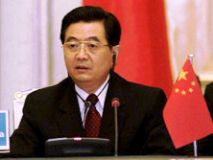Chinese president urged to take tough line on Darfur
Jan 24, 2007 (LONDON) — China should not allow the Sudanese president to say ‘no’ to U.N. peacekeepers for Darfur, a human rights activist said on Wednesday, after officials in Beijing outlined Chinese President Hu Jintao’s upcoming visit to Sudan.
 Lawrence Rossin, international coordinator of the private U.S.-based Save Darfur Coalition, said in an interview in London that Chinese officials have assured him they were using their status as a major trading partner with Sudan and working behind the scenes to try to persuade the country to bow to international will.
Lawrence Rossin, international coordinator of the private U.S.-based Save Darfur Coalition, said in an interview in London that Chinese officials have assured him they were using their status as a major trading partner with Sudan and working behind the scenes to try to persuade the country to bow to international will.
But Rossin, a former U.S. diplomat, said he has seen little evidence Chinese efforts were having an effect on Sudanese President Omar al-Bashir, who has rejected U.N., U.S., European and African Union calls to replace an AU peacekeeping force of about 7,000 in Darfur with a more powerful U.N. force of 22,000.
The AU force has been unable to quell fighting in the war-torn eastern region of Sudan, where some of the worst violence is blamed on the government and militias said to be backed by the government.
The Chinese are “going to have to make a decision about this,” Rossin said. “Either their quiet diplomacy is working … or they’re going to have to realize that (al-Bashir is) stiffing them, too. And I don’t think a country like China should take `no’ for an answer.”
Earlier Wednesday, Assistant Chinese Foreign Minister Zhai Jun Zhai said Hu would discuss Darfur with al-Bashir, but offered no specifics. China, a permanent member of the U.N. Security Council and one of Sudan’s biggest customers for oil, has resisted attempts to use U.N. sanctions to force the Sudanese government to accept U.N. peacekeepers.
Hu’s Feb. 2-3 Sudan visit is part of an African tour that will also take him to Cameroon, Liberia, Zambia, Namibia, South Africa, Mozambique and Seychelles. China’s focus on Africa, where it can find the raw materials and markets to fuel its growing economy, has been accompanied by accusations it is willing to overlook human rights abuses in order to further its interests on the continent.
Critics often point to Sudan, China’s third largest trading partner in Africa, as a prime example.
Rossin’s Save Darfur Coalition has used tactics reminiscent of a U.S.-style election campaign _ petition drives, rallies, celebrity lobbyists like George Clooney and Don Cheadle _ to raise public awareness about the violence in Darfur and pressure governments to act. In December, Rossin accompanied Clooney to China, where they discussed Darfur with Foreign Ministry officials.
More recently, Rossin went to Sudan with New Mexico Governor Bill Richardson, who brokered a truce between the government and Darfur rebels. The African Union confirmed Monday that Sudan’s air force bombed Darfur villages last week, breaking the truce.
Rossin said repeated truce violations _ committed by both sides _ and al-Bashir’s refusal to allow in U.N. peacekeepers meant the world should take “tough action”: sanctions, the imposition of a no-fly zone, or the deployment of peacekeepers without Sudan’s approval. Rossin was critical not only of China, but of Europe and the United States, who he says could take action outside the U.N., where China has opposed sanctions.
The new U.N. secretary-general, Ban Ki-moon, has made Darfur a priority. European and U.S. officials have spoken out repeatedly on Darfur. U.S. President George W. Bush included Darfur among a number of U.S. foreign policy preoccupations during his State of the Union speech on Tuesday, saying his administration would “continue to awaken the conscience of the world to save the people of Darfur.”
Rossin, while acknowledging Iraq, Afghanistan and other international crises were competing for attention, was unimpressed with Bush’s mention of Darfur.
“My reaction to that is: ‘We raise consciousness. Your job is to do something.'”
(AP)
